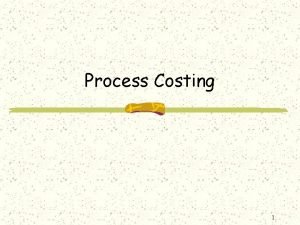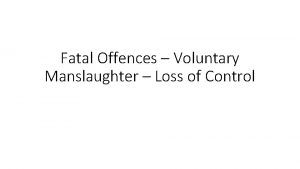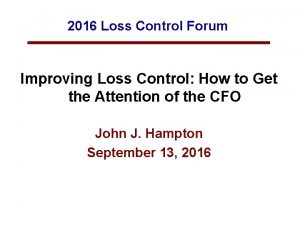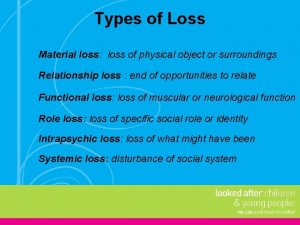Evaluation of Loss of Control Evaluation of Voluntary






- Slides: 6

Evaluation of Loss of Control

Evaluation of Voluntary Manslaughter – Loss of Control • Coroners and Justice Act 2009 abolished the much criticised defence of provocation and replaced it with the defence of loss of control • Requires D to prove loss of control from a qualifying trigger • When evaluating Lo. C, generally need to consider: • What problems were in the old law of provocation • How the new law tries to rectify this • What problems remain • 2 main issues: • Fear trigger – Fear of serious violence • Anger trigger – Things done or said…

Fear trigger - Fear of Serious Violence • Under law of provocation, had to be a sudden and temporary loss of control • Created a problem – women who were being abused could often not use the defence - women are usually physically weaker than men and less likely to react straight away when attacked by a violent partner but if there was a time lapse, they could not show the loss of control was sudden and temporary • New law of Lo. C - First qualifying trigger of “fear of serious violence” attempts to address the problem faced by women who kill their partners after suffering abuse by them • In Ahluwalia D waited until husband was asleep and defence of provocation would not have been available to her • Removal of suddenness requirement is a positive change as is the recognition that killing through fear is as justified as killing through anger • But – still a requirement that to lose self-control based on fear, and this may be difficult to prove as people do not typically lose self-control when afraid

Suggested Reform for Fear Trigger • Law Commission suggests - remove the need for loss of self-control in relation to fear of serious violence – to protect abused women more adequately • This means defence could be pleaded where D acts our of fear of serious violence without needing to prove a loss of self-control

Anger trigger - Things Done or Said… • Criticism of defence of provocation was that almost any words or conduct could be considered to have provoked D to kill – e. g. Doughty – crying baby was said to amount to provocation • New law of Lo. C - Qualifying triggers prevent such situations • S. 55 Coroners and Justice Act 2009 applies if D’s loss of control was attributable to things said or done which constituted circumstances of an extremely grave character and caused D to have a justifiable sense of being seriously wronged. Now the test is objective – situation in Doughty would not now be covered by the partial defence • Old Law of provocation – allowed sexual infidelity to amount to provocation • S. 55 excludes sexual infidelity from contributing to a qualifying trigger • Parliament excluded sexual infidelity to prevent situations where men were provided with an excuse for killing an unfaithful partner and being treated more leniently – killing an unfaithful partner would always be classed as murder • But – defining what is meant by sexual infidelity is problematic • Clinton – allowed the defence to be put to the jury as sexual infidelity was only part of the reason for D’s loss of control – this precedent dilutes the provision as in many cases the sexual infidelity is likely to be part of the context rather than the only factor so there are questions as to whether the judges really followed the intentions of Parliament in this case • Also there is an argument that sexual infidelity is one of the most likely causes for someone losing their self-control and therefore should not have been excluded in the first place

Suggested Reform for Anger Trigger • Sexual infidelity exception may need to be removed or revised in light of the decision in Clinton • Some argue the 2 nd trigger should be abolished altogether as there can be no excuse for killing in anger • In New Zealand, following a case where a man stabbed his girlfriend over 200 times, claiming she had provoked him, the Government decided to abolish the defence of provocation altogether. Justice Minister of NZ said it provides a defence for lashing out in anger and “violent homicidal rage”. It “rewards lack of self-control by enabling intentional killing to be categorised as something other than murder” • Some critics in the UK argue that the 1 st qualifying trigger should be retained but the 2 nd should be withdrawn











